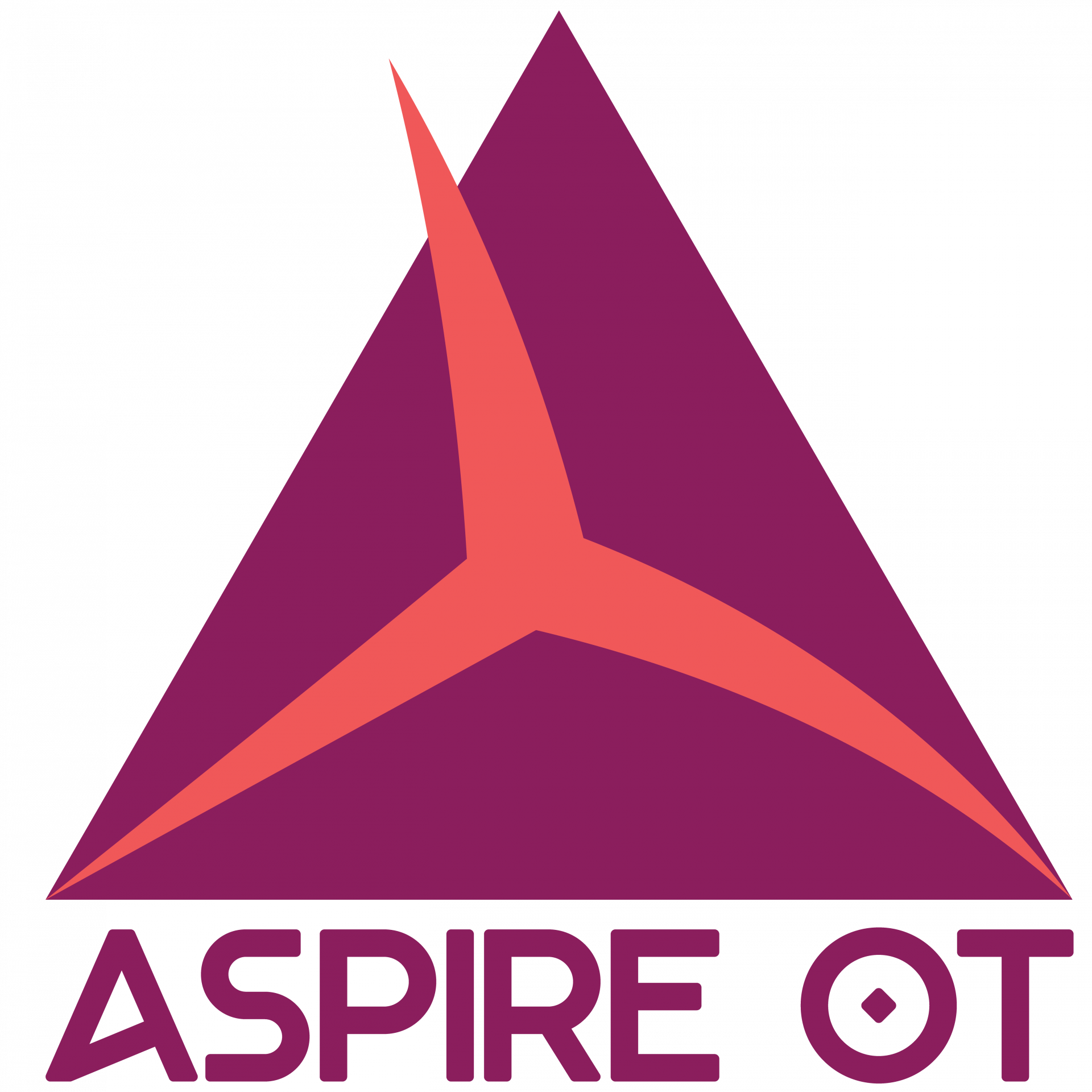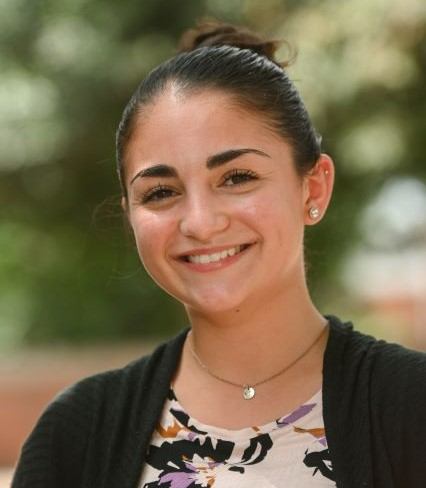
Welcome to guest blogger:
Cynthia Coronel, OTS
Aspire OT is always excited to celebrate OTs, OTAs, and students who make an impact. Cynthia Coronel is an occupational therapy student at University of Tennessee at Chattanooga.
Hello everyone! My name is Cynthia Coronel, and I am a third year OTD student at The University of Tennessee at Chattanooga. Over the past four months, I have been completing my doctoral capstone project at my undergraduate institution, Dalton State College (DSC), to develop an OT-based resource to improve the overall college experience for First-Generation College Students (FGCS).
Multiple research studies conducted across higher education institutions share how FGCS face barriers to academic success and health and well-being due to common life factors that impact students’ roles and habits leading to an increasing risk of poor academic performance and development of mental health illnesses (Longwell-Grice et al., 2016; Pedrelli et al., 2015; Stebleton & Soria, 2012). As a result, many articles call for more supports across college campuses to better determine the needs of FGCS, to better recognize and resolve the unique challenges impacting college success, and to better support this underserved population socially (Longwell-Grice et al., 2016; Suwinyattichaiporn & Johnson, 2020). In this post, you will read how I introduced OT onto the college campus of DSC and used OT practice to create support for FGCS success.
When I began brainstorming what I wanted to do for my capstone project, I narrowed my options down to two different passions that were meaningful to me:
1.) Giving back to my community
2.) Introducing the benefits of OT into non-traditional settings
From these two topics and the help of my site and faculty mentors, I was able to immerse myself into the culture and current resources offered at DSC and learn about the 52% of FGCS that make up the college campus of DSC (Third Wave Digital, 2023). As a first-gen college student myself, I knew my perspective would provide a unique look into the feedback and observations collected and analyzed. With this perspective as well as my views on occupation, I wanted to make sure all the data I collected was used to create a resource that was intentional and meaningful to FGCS.
Before sharing the series of events I went through to create the resource for FGCS, I think it is important to share the definition I used to determine if a student was first generation. According to Stebleton & Soria (2012), there are multiple variations to how institutions nationwide word the definition of being a FGCS. For my research and project, I used the definition that DSC uses, which is the same definition used by the Center for First-Generation Student Success. ·
First-Generation College Student: “Being a first-gen student means that your parents did not complete a 4-year college or university degree” (Center for First-Generation Student Success, 2020).
Once this definition was determined, it was time to discover the needs of FGCS on campus. I completed a needs assessment by conducting research using a mixed-method approach to create 1 student survey and 1 faculty/staff survey as well as conduct 2 formal interviews. In addition, I spent my days on campus interacting with students, sitting in offices for student meetings, participating in campus events, and attending community events hosted by DSC. By involving myself with DSC, I quickly learned about this institution’s mission and vision for inspiring and providing support for all cultures and backgrounds. I also learned what most students at DSC value and need most for college success. Specifically, I was able to conclude two important themes that many FGCS, faculty, and staff reported as important for college success: Trusting relationships and peer academic support. In addition to discovering these two themes, I also spent time speaking to staff members on campus and learned that student leaders and peer educators on campus receive most of their training virtually due to scheduling difficulties. From these findings, I began to develop my resource.
Because OT practice involves ensuring individuals are engaging in their meaningful occupations successfully, I wanted to make sure students were receiving the adequate academic support from peer educators while also making certain that peer educators such as Tutors and Supplemental Instruction Leaders were receiving the adequate training needed to feel confident in their skills when interacting with first-gen student tutees. With guidance from my faculty mentors and assistance from the staff member over peer education, I was able to develop a training manual that would guide a 5-week training workshop for peer educators and provide these student leaders with an environment to practice interpersonal skills required for creating trusting relationships with FGCS.
To design my training manual, I used the Model of Human Occupation (MOHO) to guide what my sessions would be teaching. The relationship between the elements of volition, habituation, and performance capacity played a key role in organizing my sessions. Because FGCS on campus shared a common belief (volition) that academic success and overall health (performance capacity) are impacted by daily interactions and conversations with peers on campus (habituation), I chose to focus my training on strengthening the interpersonal skills of peer educators since this specific group of leaders on campus are heavily valued by FGCS as a resource for college success.
My 5-week training workshop consisted of 1 session per week for 1 hour allowing peer educators of various majors to work in a small group to practice skills through interactive discussions, various activities, and role-playing opportunities. Each session was organized using Cole’s Seven Steps of Managing Groups (Introduction, Activity, Sharing, Processing, Generalizing, Application, and Summary) with activities intentionally chosen to focus on 1 interpersonal skill each session. I used Cole’s Seven Steps to create my training manual and guide my sessions based on the evidence of group community OT intervention improving student skills (Cole, 2018). To measure the outcome of the training workshop, I created a self-assessment using Likert scale questions for participants to complete during the first and last session to rate their interpersonal skill level before and after participation in the training workshop.
Hello everyone! My name is Cynthia Coronel, and I am a third year OTD student at The University of Tennessee at Chattanooga. Over the past four months, I have been completing my doctoral capstone project at my undergraduate institution, Dalton State College (DSC), to develop an OT-based resource to improve the overall college experience for First-Generation College Students (FGCS).
Multiple research studies conducted across higher education institutions share how FGCS face barriers to academic success and health and well-being due to common life factors that impact students’ roles and habits leading to an increasing risk of poor academic performance and development of mental health illnesses (Longwell-Grice et al., 2016; Pedrelli et al., 2015; Stebleton & Soria, 2012). As a result, many articles call for more supports across college campuses to better determine the needs of FGCS, to better recognize and resolve the unique challenges impacting college success, and to better support this underserved population socially (Longwell-Grice et al., 2016; Suwinyattichaiporn & Johnson, 2020). In this post, you will read how I introduced OT onto the college campus of DSC and used OT practice to create support for FGCS success.
When I began brainstorming what I wanted to do for my capstone project, I narrowed my options down to two different passions that were meaningful to me:
1.) Giving back to my community
2.) Introducing the benefits of OT into non-traditional settings
From these two topics and the help of my site and faculty mentors, I was able to immerse myself into the culture and current resources offered at DSC and learn about the 52% of FGCS that make up the college campus of DSC (Third Wave Digital, 2023). As a first-gen college student myself, I knew my perspective would provide a unique look into the feedback and observations collected and analyzed. With this perspective as well as my views on occupation, I wanted to make sure all the data I collected was used to create a resource that was intentional and meaningful to FGCS.
Before sharing the series of events I went through to create the resource for FGCS, I think it is important to share the definition I used to determine if a student was first generation. According to Stebleton & Soria (2012), there are multiple variations to how institutions nationwide word the definition of being a FGCS. For my research and project, I used the definition that DSC uses, which is the same definition used by the Center for First-Generation Student Success. ·
First-Generation College Student: “Being a first-gen student means that your parents did not complete a 4-year college or university degree” (Center for First-Generation Student Success, 2020).
Once this definition was determined, it was time to discover the needs of FGCS on campus. I completed a needs assessment by conducting research using a mixed-method approach to create 1 student survey and 1 faculty/staff survey as well as conduct 2 formal interviews. In addition, I spent my days on campus interacting with students, sitting in offices for student meetings, participating in campus events, and attending community events hosted by DSC. By involving myself with DSC, I quickly learned about this institution’s mission and vision for inspiring and providing support for all cultures and backgrounds. I also learned what most students at DSC value and need most for college success. Specifically, I was able to conclude two important themes that many FGCS, faculty, and staff reported as important for college success: Trusting relationships and peer academic support. In addition to discovering these two themes, I also spent time speaking to staff members on campus and learned that student leaders and peer educators on campus receive most of their training virtually due to scheduling difficulties. From these findings, I began to develop my resource.
Because OT practice involves ensuring individuals are engaging in their meaningful occupations successfully, I wanted to make sure students were receiving the adequate academic support from peer educators while also making certain that peer educators such as Tutors and Supplemental Instruction Leaders were receiving the adequate training needed to feel confident in their skills when interacting with first-gen student tutees. With guidance from my faculty mentors and assistance from the staff member over peer education, I was able to develop a training manual that would guide a 5-week training workshop for peer educators and provide these student leaders with an environment to practice interpersonal skills required for creating trusting relationships with FGCS.
To design my training manual, I used the Model of Human Occupation (MOHO) to guide what my sessions would be teaching. The relationship between the elements of volition, habituation, and performance capacity played a key role in organizing my sessions. Because FGCS on campus shared a common belief (volition) that academic success and overall health (performance capacity) are impacted by daily interactions and conversations with peers on campus (habituation), I chose to focus my training on strengthening the interpersonal skills of peer educators since this specific group of leaders on campus are heavily valued by FGCS as a resource for college success.
My 5-week training workshop consisted of 1 session per week for 1 hour allowing peer educators of various majors to work in a small group to practice skills through interactive discussions, various activities, and role-playing opportunities. Each session was organized using Cole’s Seven Steps of Managing Groups (Introduction, Activity, Sharing, Processing, Generalizing, Application, and Summary) with activities intentionally chosen to focus on 1 interpersonal skill each session. I used Cole’s Seven Steps to create my training manual and guide my sessions based on the evidence of group community OT intervention improving student skills (Cole, 2018). To measure the outcome of the training workshop, I created a self-assessment using Likert scale questions for participants to complete during the first and last session to rate their interpersonal skill level before and after participation in the training workshop.
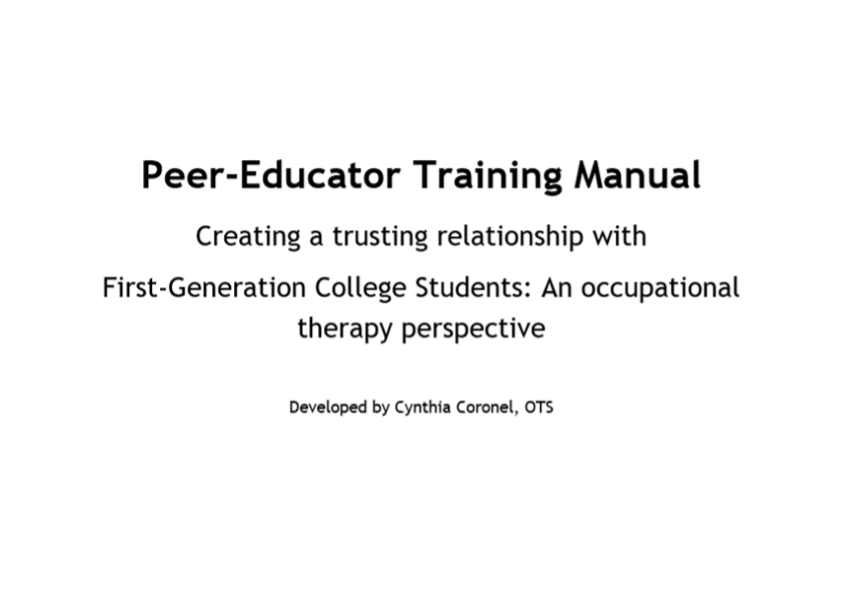

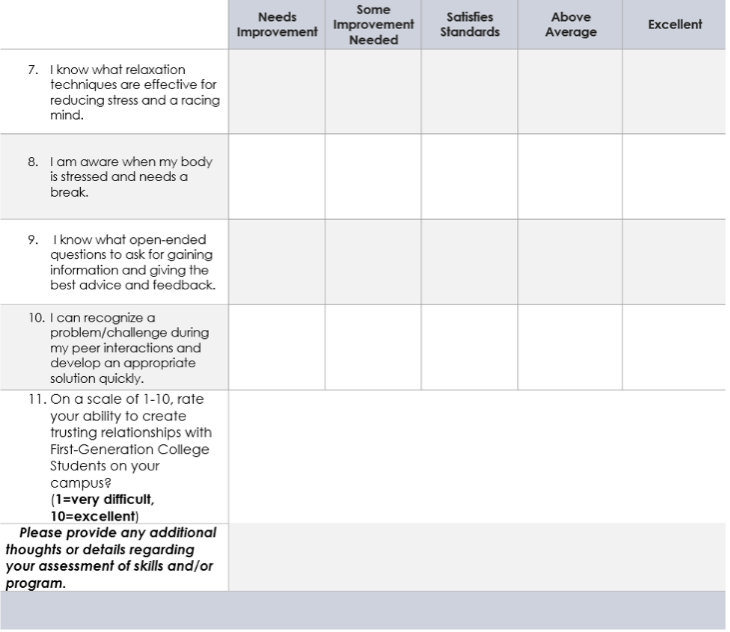
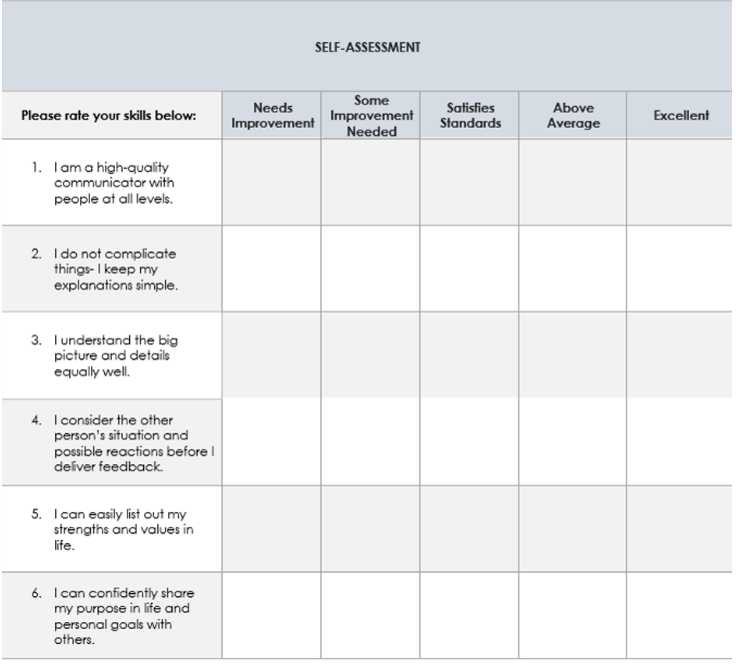
Over 5 weeks, 6 peer educator participants interacted with one another to work on skills such as self-confidence, communication and active listening, empathy, self-awareness, and critical thinking. I specifically chose these interpersonal skills by using activity analysis to break down what intrinsic factors are needed to form trusting relationships. After choosing the 5 interpersonal skills the sessions would focus on, I used evidenced-based research to select group activities that would engage my participants but also challenge the growth of their interpersonal skills through activity.
Session 1:
This first session consisted of an introduction to the training workshop and a group mission statement activity that worked on self-confidence as participants worked together to make a peer educator mission statement.
This first session consisted of an introduction to the training workshop and a group mission statement activity that worked on self-confidence as participants worked together to make a peer educator mission statement.
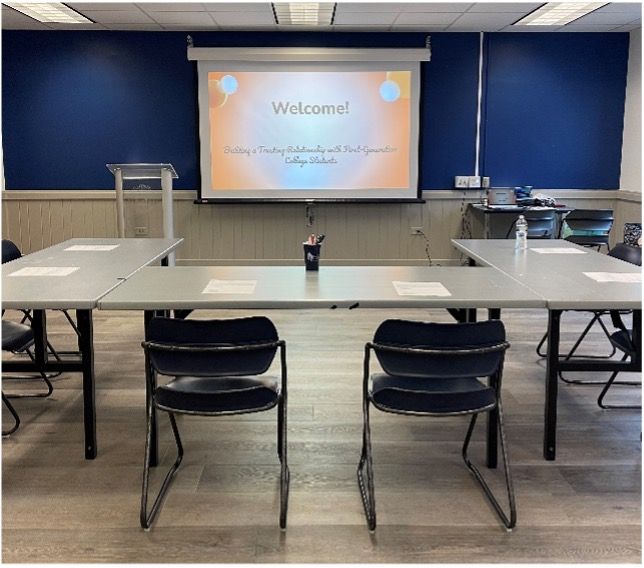
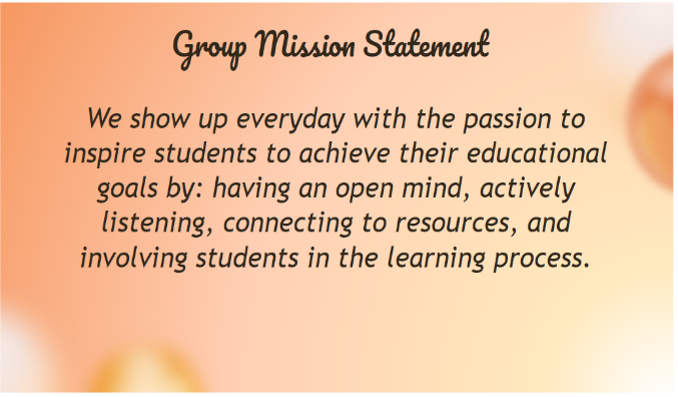
Left picture: Room layout for my 5-week training workshop.
Right picture: Six peer educators shared strengths and passions of being a student leader on campus to collaborate on creating this group mission statement and strengthening self-confidence skills.
Right picture: Six peer educators shared strengths and passions of being a student leader on campus to collaborate on creating this group mission statement and strengthening self-confidence skills.
Session 2:
This session allowed group members to practice their communication and active listening skills while working with tutees. Participants paired up and engaged in a back-to-back drawing activity with one student acting as the active listener to draw the picture while the other student played the role as the communicator providing simple directions.
This session allowed group members to practice their communication and active listening skills while working with tutees. Participants paired up and engaged in a back-to-back drawing activity with one student acting as the active listener to draw the picture while the other student played the role as the communicator providing simple directions.

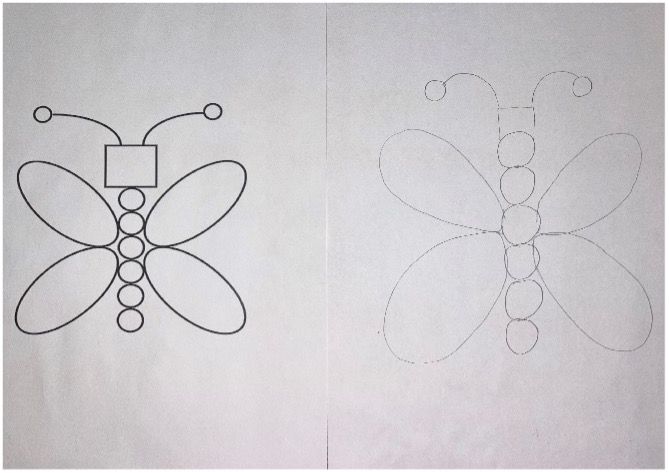

Pictures Above: These images highlight the importance of providing specific details when communicating to others. Peer educators were able to take this experience and apply how wording directions and listening to details is not only crucial for this activity but also important when explaining content during tutoring sessions.
Session 3: This session focused on the skill of empathy and allowed participants to learn about common challenges faced by FGCS and create affirmations that tutees can grab during tutoring sessions.

Picture Above: Peer educators created affirmation cards for tutees to grab during tutoring sessions for encouragement. Participants were able to reflect on previous experiences with tutees and practice putting themselves in their peers’ shoes when engaging in this activity to practice the difference between sympathy and empathy.
Session 4: This session focused on the skill of self-awareness and provided students with an environement to practice the 5-4-3-2-1 grounding method while also watching a quick instructional video about self-awareness. Afterwards, participants engaged in a game of UNO to practice self-awareness. Both videos used during the session can be accessed below.
Self-Awareness Video
Grounding Practice
Self-Awareness Video
Grounding Practice
Session 5:
In the final session of the workshop, participants learned about critical thinking strategies and the six thinking hats. Participants practiced this skill through role playing activities designed for tutors. Role playing scenarios were retrieved from Weebly website and included events that could occur during tutoring sessions allowing participants to work on problem solving and conflict resolution skills (Weebly, n.d.). The link below was used to provide participants with a visual explanation of the six thinking hats of critical thinking.
Six Thinking Hats
In the final session of the workshop, participants learned about critical thinking strategies and the six thinking hats. Participants practiced this skill through role playing activities designed for tutors. Role playing scenarios were retrieved from Weebly website and included events that could occur during tutoring sessions allowing participants to work on problem solving and conflict resolution skills (Weebly, n.d.). The link below was used to provide participants with a visual explanation of the six thinking hats of critical thinking.
Six Thinking Hats

Picture Above: The picture demonstrates role-playing scenario 1 out of 6 that participants engaged in during the last training session. Participants paired up and had the opportunity to take turns playing the tutor and tutee while intentionally using the six different hats of critical thinking.
Throughout each session, participants provided feedback on the benefits of the activities and shared how the content applied to interactions with tutees. The peer educators also shared how an interactive small group training workshop was a valuable supplement to their original virtual meetings and monthly, large group trainings. Each participant shared positive feedback about the intervention approach used to design the training program and about the program’s effectiveness for developing interpersonal skills for building trusting relationships with FGCS. In addition, participants recommended the workshop to future peer educators as a beneficial training for professional development.
Although creating my training workshop was the big goal I had upon arrival on campus, it was not the only objective I worked towards during my time at DSC. While creating and leading my training sessions, I also spent time on campus advocating to staff about the importance of OT and educating students and staff members about what OT is and the benefits of OT practice on college campuses. By speaking to upper-level science classes and student organizations, I was able to provide education to students on the impact OT has in different settings and practice areas, the various professionals OT practitioners have the pleasure to work alongside, and the steps to take to pursue this unique career path.
Through this capstone project, I was able to learn and demonstrate the unique impact OT practice can make on college campuses. The results of this project share how OT can be used to learn what FGCS find most supportive for college success and how OT students and practitioners have the expertise to create universally designed resources that not only benefit FGCS but also support the educational and professional growth of students, staff, and faculty that make up a campus community. According to Longwell-Grice et al. (2016), students feel more motivated to do well in college when they can see and feel that people at their college care and support them. My findings at DSC show the possibilities to an endless number of opportunities that OT practitioners and OT capstone students can seize to make a significant impact on the lives of college students. I am so grateful for this capstone experience because of the wonderful students and staff members I had the chance to meet, the personal and professional growth I have seen in myself through this process, and the opportunity to share this amazing profession with others.
References
Center for First-Generation Student Success. (2020). Are you a first-generation student?. https://firstgen.naspa.org/why-first-gen/students/are-you-a-first-generation-student#:~:text=Being%20a%20first%2Dgen%20student%20means%20that%20your%20parent(s,you%20navigate%20your%20college%20journey!Cole, M. B. (2018).
Group dynamics in occupational therapy: The theoretical basis and practice application of group intervention (5th ed.). Slack Incorporated.
Electricity Human Resources Canada. (2021).
Professional skills: Self-awareness. YouTube. https://youtu.be/SaoVqugPZQE?si=VCAi76YWBhusksTi
Longwell-Grice, R., Adsitt, N. Z., Mullins, K., & Serrata, W. (2016). The first ones: Three studies on first-generation college students. NACADA Journal, 36(2), 34–46. https://doi.org/10.12930/nacada-13-028
Mind Matters Minutes. (2021). Introduction to 5-4-3-2-1 and skill practice. YouTube. https://www.youtube.com/watch?v=BsKpumL-ohQ
Pedrelli, P., Nyer, M., Yeung, A., Zulauf, C., & Wilens, T. (2015). College students: Mental health problems and treatment considerations. Academic Psychiatry, 39(5), 503–511. https://doi.org/10.1007/s40596-014-0205-9
Stebleton, M. J., & Soria, K. M. (2012). Breaking down barriers: Academic obstacles of first-generation students at research universities. Learning Assistance Review, 17(2), 7–20. https://files.eric.ed.gov/fulltext/EJ1002281.pdf
Suwinyattichaiporn, T., & Johnson, Z. D. (2020). The impact of family and friends social support on Latino/a first-generation college students’ perceived stress, depression, and social isolation. Journal of Hispanic Higher Education, 21(3), 297–314. https://doi.org/10.1177/1538192720964922
The de Bono Group. (n.d.). Six thinking hats. De Bono Group. https://www.debonogroup.com/services/core-programs/six-thinking-hats/
Third Wave Digital. (2023). Dalton State College. https://www.daltonstate.edu/skins/userfiles/files/Quick%20Facts%20031023.pdf
Weebly. (n.d.). Role playing scenario cards for initial tutor training. Weebly. https://albrightcrla.weebly.com/uploads/3/5/1/6/3516715/tutor_training_role_plays_wc_and_alc.pdf
Although creating my training workshop was the big goal I had upon arrival on campus, it was not the only objective I worked towards during my time at DSC. While creating and leading my training sessions, I also spent time on campus advocating to staff about the importance of OT and educating students and staff members about what OT is and the benefits of OT practice on college campuses. By speaking to upper-level science classes and student organizations, I was able to provide education to students on the impact OT has in different settings and practice areas, the various professionals OT practitioners have the pleasure to work alongside, and the steps to take to pursue this unique career path.
Through this capstone project, I was able to learn and demonstrate the unique impact OT practice can make on college campuses. The results of this project share how OT can be used to learn what FGCS find most supportive for college success and how OT students and practitioners have the expertise to create universally designed resources that not only benefit FGCS but also support the educational and professional growth of students, staff, and faculty that make up a campus community. According to Longwell-Grice et al. (2016), students feel more motivated to do well in college when they can see and feel that people at their college care and support them. My findings at DSC show the possibilities to an endless number of opportunities that OT practitioners and OT capstone students can seize to make a significant impact on the lives of college students. I am so grateful for this capstone experience because of the wonderful students and staff members I had the chance to meet, the personal and professional growth I have seen in myself through this process, and the opportunity to share this amazing profession with others.
References
Center for First-Generation Student Success. (2020). Are you a first-generation student?. https://firstgen.naspa.org/why-first-gen/students/are-you-a-first-generation-student#:~:text=Being%20a%20first%2Dgen%20student%20means%20that%20your%20parent(s,you%20navigate%20your%20college%20journey!Cole, M. B. (2018).
Group dynamics in occupational therapy: The theoretical basis and practice application of group intervention (5th ed.). Slack Incorporated.
Electricity Human Resources Canada. (2021).
Professional skills: Self-awareness. YouTube. https://youtu.be/SaoVqugPZQE?si=VCAi76YWBhusksTi
Longwell-Grice, R., Adsitt, N. Z., Mullins, K., & Serrata, W. (2016). The first ones: Three studies on first-generation college students. NACADA Journal, 36(2), 34–46. https://doi.org/10.12930/nacada-13-028
Mind Matters Minutes. (2021). Introduction to 5-4-3-2-1 and skill practice. YouTube. https://www.youtube.com/watch?v=BsKpumL-ohQ
Pedrelli, P., Nyer, M., Yeung, A., Zulauf, C., & Wilens, T. (2015). College students: Mental health problems and treatment considerations. Academic Psychiatry, 39(5), 503–511. https://doi.org/10.1007/s40596-014-0205-9
Stebleton, M. J., & Soria, K. M. (2012). Breaking down barriers: Academic obstacles of first-generation students at research universities. Learning Assistance Review, 17(2), 7–20. https://files.eric.ed.gov/fulltext/EJ1002281.pdf
Suwinyattichaiporn, T., & Johnson, Z. D. (2020). The impact of family and friends social support on Latino/a first-generation college students’ perceived stress, depression, and social isolation. Journal of Hispanic Higher Education, 21(3), 297–314. https://doi.org/10.1177/1538192720964922
The de Bono Group. (n.d.). Six thinking hats. De Bono Group. https://www.debonogroup.com/services/core-programs/six-thinking-hats/
Third Wave Digital. (2023). Dalton State College. https://www.daltonstate.edu/skins/userfiles/files/Quick%20Facts%20031023.pdf
Weebly. (n.d.). Role playing scenario cards for initial tutor training. Weebly. https://albrightcrla.weebly.com/uploads/3/5/1/6/3516715/tutor_training_role_plays_wc_and_alc.pdf
Aspire OT works to support OT and OTA Students
Write your awesome label here.
Occupational Therapy Courses to Recharge Your Practice
Aspire OT is a different kind of CEU company, owned by an OT & OTA.
Aspire OT is an AOTA Approved Provider
&
Approved Sponsor

Don't Miss A Thing!
Follow us on social media to stay up to date on all of our latest postings.
Join our newsletter
Get weekly updates on new blog posts, webinars, on-demand courses and more right in your mailbox.
Thank you!
